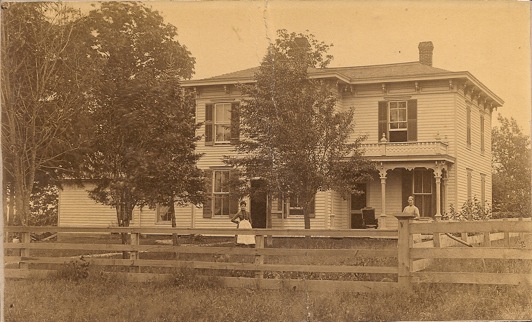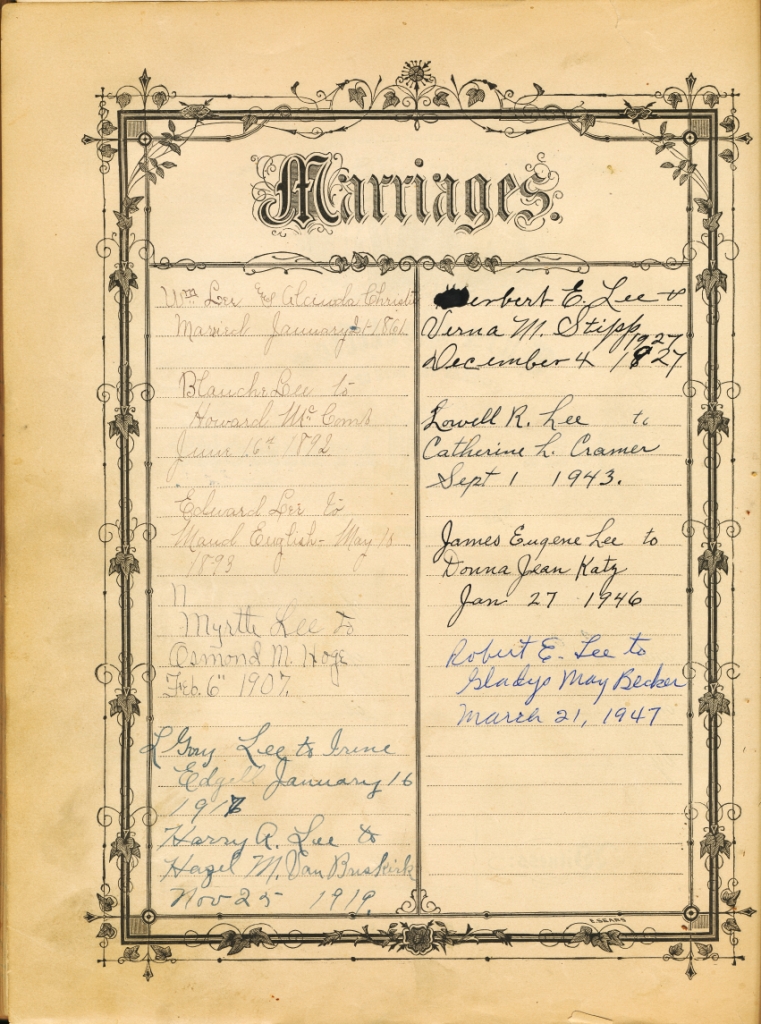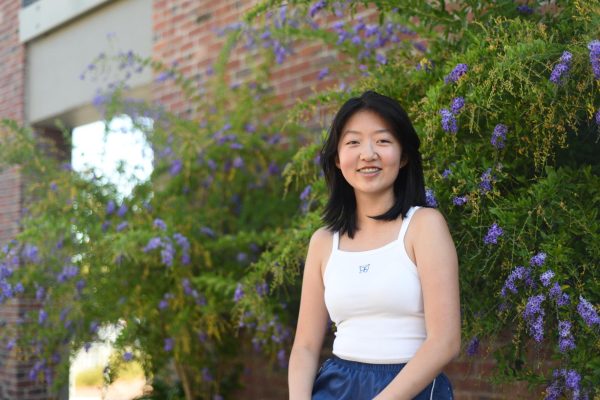The Lee family’s history in America is older than the country itself. In the late 1600s, Anthony Lee moved from England to what would later be known as the United States to escape religious persecution as a Quaker. Nine generations of Lees later would come junior Kathryn and sophomore Sean Foo, siblings attending MVHS.
Robin Lee, the grand-aunt of Kathryn and Sean, has spent 20 years tracing the Lee’s genealogy and has managed to trace it from Nottinghamshire, England in the 1500s to the family being indirectly related to Confederate Gen. Robert E. Lee. Her motivation, which started out as proving true the family stories she heard as a child, has changed over the years to tracking her genealogy.
“In trying to prove them true, I actually proved most stories to be false,” Robin said. “But out of that, I learned a lot about my family. I was able to start helping other people who were seeking the same kind of information. And then you start finding, ‘Oh my gosh, we’re seventh cousins.’ After that, it became a lot of fun to do. That’s what really kept me going in the whole process.”
Anthony’s journey for freedom in a new land is representative of many other immigrants moving to the U.S. To Sean, the unique job opportunities and freedom that America offers are some of the key qualities of America, especially when compared with other countries during that time period.
Six generations after Anthony, by the early 20th century, farming became more mechanized and running small family farms no longer made enough to support the Lee family. Lewis Guy Lee, Robin’s grandfather, began selling shoes to nearby farmers to make a living. As business appeared to be booming, the Lee family moved from Cardington, Ohio to California just before the Great Depression. Craig Lee, Lewis’ grandson and Robin’s brother, remembers the stories his father shared about his childhood in great detail.
“When my dad was 10 years old, all of a sudden the Great Depression hit and everything closed down,” Craig said. “Everything went out of business. My grandfather’s shoe business evaporated. My dad grew up quickly at 14 years old. He was 10 years old when he started delivering papers. By the time he was 13 or 14 years old, he bought a car and was driving it.”
Craig says that as a result of growing up in the Great Depression, his parents were extremely frugal. Craig’s father also encouraged Craig to get a job delivering newspapers when he was young, and Craig recalled his bike was so heavy with newspapers that when it fell over, he was unable to lift his bike upright again. This experience helped Craig develop a good work ethic and appreciation for the value of money. He proved this at his job at aerospace and defense company Lockheed Martin, where Craig was constantly streamlining processes and using technology to find a more efficient way of doing work than his peers. Due to heightened tensions between the U.S. and China during the Cold War, Craig wasn’t given clearance in fear that their military technology secrets could be leaked. As a result, despite Craig’s work ethic, his advancement in the company was limited by who he chose to marry.
“One problem was who I was married to. I couldn’t get a clearance because of my wife’s ethnicity,” Craig said. “It was because she’s Chinese and was born in mainland China and raised in Taiwan. I just wasn’t eligible.”
Craig’s choice to marry a Chinese woman didn’t just cause a difference in treatment for him, but also for his daughter Amanda Foo. Although her grandparents on Craig’s side of the family never treated her badly, she did notice differences in how she was treated by her dad’s side of the family when compared to mom’s side of her family.
“I definitely knew I didn’t spend as much time with my grandparents on my dad’s side, and we didn’t have the ease in which we interacted on my mom’s side,” Amanda said. “In terms of family, I felt a little removed. My dad’s parents would come for Grandparents Day at my school, but there wasn’t as much of the affection I got from my mom’s side there.”
As a result, Amanda feels closer to the Chinese side of her identity. Sean, her son, also feels the same way. He attributes part of the reason why to growing up in a predominantly Asian community, but most of it to how he was raised.
“Growing up, I’ve been raised with more of my Chinese culture than I have with my American,” Sean said. “I’ve known more about my Chinese history than I do about my American history. And most of my family is Chinese. I’ve been mainly raised Chinese because I only see Grandpa, the only white person in my family, at most once a month. I feel like I was just raised in a Chinese household.”
Despite her closeness to the Chinese side of her family, Amanda still hopes to pass on the rich American culture from Craig’s side of the family to her children. She plans on learning traditional American dishes, such as bombastic beans, to pass on as well as passing on the Lee family heirlooms that she will inherit.
The oldest of these heirlooms is a family Bible that is over 200 years old. Recorded in the Bible are names and dates of significant events in the family history such as births, deaths and marriages. Robin currently has possession of the Bible, along with a letter written by Kathryn and Sean’s great-great-great-grandma, Maud Lee, that contained family stories “for anybody in the future who might be interested.” These heirlooms were an integral part of tracing the Lee family history, and in order to protect them, Robin has saved them online.
“Over the last 10 years, what has actually improved genealogy the most isn’t just that you can digitize things,” Robin said. “Once you digitize something, you can then create an index to what you’ve digitized. So you can search. Just looking through 100 pictures and wondering who they are. You can put a name on that picture. You can then search and say, ‘Where’s that picture of so-and-so?’”
Additionally, Robin has uploaded her family history onto WikiTree, a free website that tracks the genealogy of people globally, in order to preserve the family history she’s unearthed. Having spent so much of her life tracing her family history, Robin feels that she has found so much more than just her ancestry. While searching for family stories, she has re-established connections with distant family members and learned more about her country.
“It has made me much more aware of the history of the United States,” Robin said. “Because the way you’re taught history, you think there was this real cohesive group of people, settlers that fought against England, that won and got their independence. And when you start doing genealogies, start finding out like the Quakers and Puritans and all these different groups you realize they weren’t really that cohesive. They had a common enemy, but they were not common. That’s why we’re called the United States.”
Robin has always tried to learn and understand more about her family history, from interviewing family members to inspecting old family photos, looking for people she hasn’t categorized yet. But an extensive knowledge of genealogy does not necessarily relate to closeness or understanding of one’s culture, especially for Sean.
“I feel like I have a decent understanding of the history on the white side of my family because my grandpa has told me a lot of stories,” Sean said. “But I don’t know many of the white traditions they do. In my Chinese culture, we have a lot of Chinese holidays and we do superstitious stuff around those holidays, like we have family meals where we do certain types of superstitious things. I definitely like to know more about what the white side of my family did superstitiously during the holidays because I want to embrace all parts of my ethnicity. I feel like if I have kids one day, just passing down not only the Chinese traditions but the white traditions would be super important so that they know who they are.”











